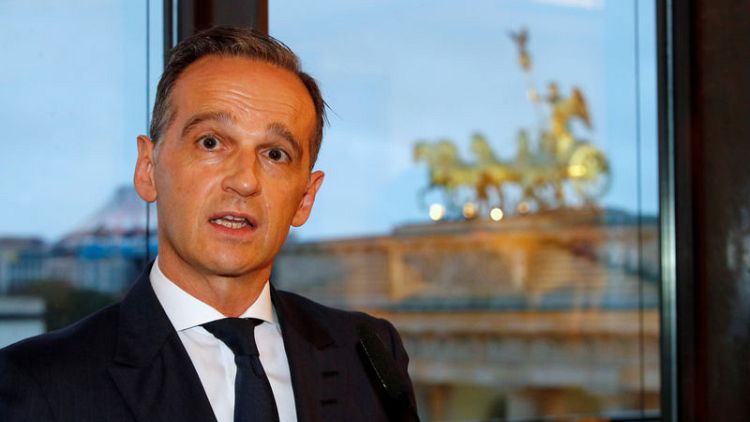By Robin Emmott
BRUSSELS (Reuters) - Britain, France and Germany must be ready to react to Iran's breaches of its 2015 nuclear deal and this could mean reimposing international sanctions on Tehran, though Europe still wants to save the accord, the German foreign minister said on Monday.
Iran said last week it had resumed low-grade uranium enrichment at its underground Fordow nuclear plant and at the weekend said it could refine up to 60% of fissile purity, not far off the 90% level needed for nuclear bomb fuel - its most significant breaches of the deal with world powers.
Iran says its violations have been driven by the United States' withdrawal from the deal last year and its reimposition of sanctions that have strangled Tehran's oil exports, and would return to compliance if Washington did so.
But the three European parties to the 2015 deal, which aimed to narrow any scope for Iran to develop a nuclear bomb, have voiced alarm at its resumption of enrichment, fearing it will make it much harder for them to salvage the unravelling accord.
Arriving at an European Union foreign ministers meeting in Brussels, German Foreign Minister Heiko Maas said he would meet his British and French counterparts in Paris later on Monday to discuss the next steps.
"Iran must finally return to its commitments. Otherwise we will reserve the right to use all mechanisms specified in the deal," Maas said, referring to steps under which international sanctions that were lifted under the pact could be reinstated.
"We see with growing concern that uranium enrichment continues and Iran has not only announced it but it goes on with it," Maas told reporters.
Under the terms of the deal, if any one of the European signatories believes Iran has violated it, they can trigger a dispute resolution process that could - within as few as 65 days - culminate at the U.N. Security Council with a so-called "snapback" of global, United Nations sanctions on Iran.
So far, the European position is that the International Atomic Energy Agency and its inspectors must first verify Iran's latest announcements on enrichment, EU diplomats said.
The European position is crucial because, after U.S. President Donald Trump renounced the accord, signed before he took office, the other signatories - Russia and China - are allies of Iran and unlikely to make such a move.
"ALL OPTIONS"
Iran's violations of key deal limits, including on stockpiles of enriched uranium and on the level of enrichment - 3.7%, deemed suitable for civilian nuclear energy - could culminate in a return of all international sanctions on Tehran.
The European Union, though desperate to rescue the accord it helped negotiate, has been unable to convince Iran to abide by it because EU efforts to protect trade and financial dividends for Iran linked to the deal have been stymied by U.S. sanctions.
Iran's reactivation of Fordow is especially sensitive as it concealed the site from U.N. non-proliferation inspectors until its exposure in 2009, and it is built inside a mountain to withstand any air strikes.
The Islamic Republic has long maintained that it wants nuclear energy only for civilian applications.
The Trump administration argues the 2015 deal did not place curbs on Iran's nuclear capability of sufficient rigour or duration and failed to address its ballistic missile programme.
While other EU governments are not directly involved in trying to shore up the nuclear accord, their view is important to Berlin, Paris and London.
"All options must be discussed, we have to keep up the pressure because we do not see progress (with Tehran)," Lithuanian Foreign Minister Linas Linkevicius told Reuters.
(Reporting by Robin Emmott; Editing by Mark Heinrich)
